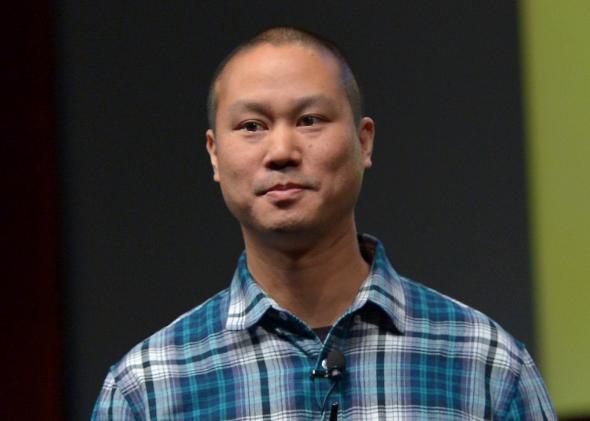Silicon Valley has a lot of odd characters, but Tony Hsieh, the founder and chief executive of Zappos, is among its oddest. He’s considered to be both introverted and intensely charismatic. He shies away from the media spotlight but allows elaborate tours of his personal quarters. He built Zappos to more than $2 billion in annual sales, then nixed all job titles and managers in favor of a radical “self-governing” structure known as “holacracy.” And he’s spent two years and hundreds of millions of dollars on remaking Las Vegas according to his lofty techtopian vision.
That last effort—the Downtown Project—has been the subject of several media reports, most recently an in-depth series by Re/code. So it came as a bit of a surprise when Re/code interrupted the slew of longform coverage to report, along with Nevada’s KNPR News, that Tony Hsieh had handed off leadership of the project to his lawyer and that 30 percent or more of the project’s staff was being laid off. Sources told Re/code that new businesses brought in by Downtown Project were “bleeding money” and that the revitalization “seems like it’s being run by kids.” One source criticized Hsieh for hiring family members and “drinking buddies.”
The latest installment in the series makes some far more sinister insinuations. Between April 2013 and May 2014, three prominent members of the 300-person Downtown Project entrepreneur community committed suicide. Hsieh, author of Delivering Happiness, “seemed to work hard to keep each suicide quiet.” Grief resources were largely unavailable. Communitywide cathartic gatherings did not take place. Asked about the events by Re/code’s Nellie Bowles, Hsieh gave this response: “Suicides happen anywhere. Look at the stats.”
If there’s a dark side of techtopia—of the arrogant-bordering-on-delusional notion that a multimillion dollar investment and a happiness manifesto can remake a struggling city—this is it. “There is a danger of happiness as a goal,” one anonymous entrepreneur told Re/code. “It’s lonely. There’s a pressure to socialize and go out. There’s a pressure to party.” The notion that simply trying to make people happy—especially those who are not—can be unwise is hardly a radical one. In his article “The Pursuit of Happiness,” Andrew Solomon writes the following:
While being optimistic reduces stress, trying to be optimistic can increase it. The notion that positive thinking is correlated with good health puts enormous pressure on people to cleave to beliefs that they don’t actually trust. Someone develops cancer, and everyone around her tries to encourage her good moods and reprimands her when she is weepy or negative. It makes for a terrible sense of failure. And if she tries to be positive and gets sicker anyway, the tendency is for her to feel guilty, somehow culpable for the degeneration.
It should be telling, then, that one of the people Hsieh reportedly hired as part of a suicide response was Mark Rowland, a career coach who goes by the title of the “Happy Cheerleader.” Or that when Factorli—the project of an entrepreneur who followed Hsieh to Las Vegas as if he were the Pied Piper—began to flail, the Downtown Project team lost interest and killed it off. And that Hsieh, for his part, said he was not involved with Factorli and told Bowles he could not answer questions about it.
It’s too soon to tell if the Downtown Project was a legitimate venture or the egomaniacal whim of a wealthy technocrat. But the sixth installment in Re/code’s series is a dark and deeply disconcerting reminder that “delivering happiness” to a real community is not so easily distilled into a 272-page book.
